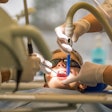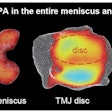
WASHINGTON (Reuters Health), May 30 - A German folk saying that means "every child costs the mother one tooth" may hold a lot of truth, research published on Thursday indicates.
Women who gave birth to more children tended to lose more teeth during their lives, regardless of whether they were rich or poor, U.S researchers found.
They examined data on 2,635 U.S. women ages 18 to 64, sorting the nationally representative sample into three categories -- low, middle, and high socioeconomic status.
In the highest socioeconomic group, women with no children were missing on average less than one tooth, those with one child were missing about two teeth, and those with four or more were missing about five teeth.
Among the women in the lowest socioeconomic group, those with no children on average were missing two teeth, those with one child were missing an average of three teeth, and those with four or more were missing more than eight teeth.
The trend also held true in the middle socioeconomic group, said the researchers at New York University and Yale University in Connecticut.
"It seems that having more children is related to having fewer teeth," New York University dental professor Dr. Stefanie Russell, who led the research published in the American Journal of Public Health, said in a telephone interview.
"People might say that happens because women who are poor have more children and women who are poor are not going to be able to afford the dentist," she said. "But we found that it was true across all socioeconomic levels."
The study did not break down the results by race.
This was the first large U.S. study to show such findings, Russell said. Earlier studies elsewhere have shown similar results, in particular Scandinavian research from the 1980s.
Russell said she was not surprised to see that the old German saying -- "Jedes kind kostet die mutter einen zahn" -- had some truth to it. But the reasons are harder to figure, with a combination of factors most likely.
Women are more prone to gingivitis during pregnancy, when the response of the oral tissues to the bacteria in the mouth is altered, Russell said.
Gingivitis occurs when bacteria build up between the teeth and gums, causing inflammation and bleeding. Untreated, it can lead to more serious gum disease and eventually tooth loss.
In addition, Russell said women may be less likely to see a dentist while pregnant, perhaps in part because they want to avoid dental x-rays due to concern over radiation exposure.
Women with multiple children may also forgo their own dental care, possibly due to lack of money or time, Russell said.
Copyright © 2008 Reuters Limited. All rights reserved. Republication or redistribution of Reuters content, including by framing or similar means, is expressly prohibited without the prior written consent of Reuters. Reuters shall not be liable for any errors or delays in the content, or for any actions taken in reliance thereon. Reuters and the Reuters sphere logo are registered trademarks and trademarks of the Reuters group of companies around the world.


















